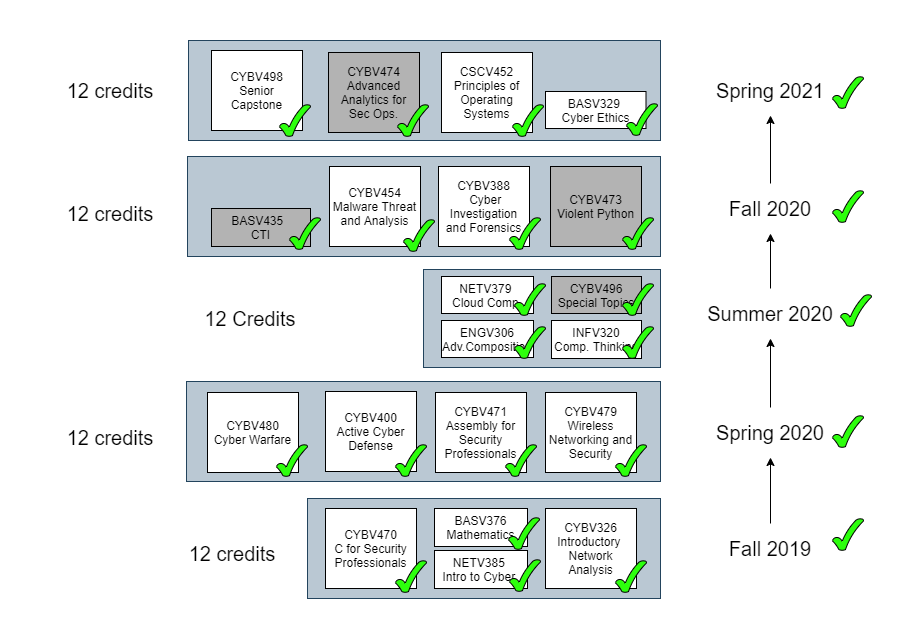BAS in Cyber Operations Engineering at UofA and NSA

In Spring 2021, I proudly graduated from the University of Arizona with a Bachelor's degree in Cyber Operations, specializing in the Engineering track. Reflecting on my academic journey, I am immensely grateful for the program's rigor and comprehensive curriculum, which provided me with the foundation needed to excel in the dynamic and challenging field of cybersecurity.
A Program Designed for Excellence
The Cyber Operations – Engineering track at the University of Arizona stands out as one of the nation’s premier cybersecurity programs. Its distinction as a National Security Agency (NSA) Center of Academic Excellence in Cyber Operations (CAE/CO) highlights the program’s credibility and adherence to the highest standards in cybersecurity education. Designed in collaboration with the NSA, the curriculum blends technical depth with real-world application, preparing students to tackle the most complex cyber challenges.
Rigorous Classes with a Purpose
The classes were undoubtedly challenging, but the difficulty was by design. Each course was meticulously structured to simulate real-world scenarios and problem-solving under pressure. From understanding adversary behavior to crafting offensive cyber operations, the program ensured that every graduate was not just academically accomplished but industry-ready.
Core Competencies in Cyber Operations
Here are some of the pillars of the program, which reflect the depth and breadth of its coursework:
- Critical Thinking & Problem Solving: Developing an analytical mindset to understand variability in outcomes, detect anomalies, and solve complex problems through computational and scripting tools.
- Cyber Threat Intelligence: Learning how to analyze and share insights about adversaries to protect critical enterprise assets effectively.
- Defensive Cyber Operations: Mastering defensive network architectures and multi-layered protection strategies to safeguard mission-critical systems.
- Forensics: Acquiring skills to investigate cyber incidents, analyze user activity, and recover hidden or deleted information.
- Law, Ethics, & Policy: Understanding the intersection of cyber ethics, law, and policy to navigate the "gray areas" of rapidly evolving technologies.
- Malware Reverse Engineering: Safely dissecting malicious software to uncover its purpose and mitigate its impact.
- Networking: Gaining a comprehensive understanding of network architecture, protocols, and their interplay across different layers.
- Offensive Cyber Operations: Exploring the phases and legal authorities of offensive cyber actions, from reconnaissance to assessment.
- Operating Systems & Low-Level Programming: Delving deep into operating systems and developing low-level applications for exploiting vulnerabilities.
- Security Principles & Vulnerabilities: Understanding the root causes of vulnerabilities and how to design solutions that ensure system integrity.
Here is a breakdown of courses that I took throughout the program:

The classes in gray were elective. The ones in white were part of the curriculum.
Preparation for a Complex Field
One of the most valuable aspects of the program was how it bridged theoretical knowledge with hands-on application. Classes weren’t just about learning concepts; they were about mastering the practical skills needed to excel in high-stakes cybersecurity roles.
As someone working in the field today, I can confidently say that the program’s rigor and NSA-designed curriculum provided me with a competitive edge. Whether I’m identifying and mitigating vulnerabilities, conducting threat intelligence, or ensuring compliance with cyber laws, the skills I honed during my time at the University of Arizona have been indispensable.
The Legacy of an Exceptional Program
Graduating from a program with NSA CAE/CO designation carries immense prestige. Employers recognize the program's reputation, knowing that its graduates are equipped with the technical acumen and ethical grounding required to succeed in cybersecurity.
For anyone considering a career in this ever-evolving field, I wholeheartedly recommend the Cyber Operations – Engineering track at the University of Arizona. It’s not just a degree; it’s a transformative experience that prepares you to lead and innovate in cybersecurity.
Conclusion
The University of Arizona’s Cyber Operations – Engineering track is more than an academic program; it’s a gateway to becoming a leader in the cybersecurity field. If you’re passionate about protecting systems, solving complex problems, and outsmarting adversaries, this program offers the perfect foundation. The journey may be tough, but the rewards are unparalleled—and as I can attest, the preparation is second to none.